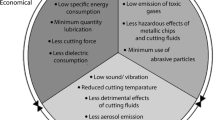Abstract
The production of high performance metal parts requires a well balanced sequence of operations and can usually technologically not be achieved in a single process. This issue leads to complex process chains on the shop floor and the requirement to split single processes into multistage processes in hard-finishing operations. In both cases, the objective for the process planning is to achieve not only a local optimum for the individual processes but rather an overall optimum for the complete sequence. In order to reach the overall optimum, the process planner needs to integrate the effects between the processes into consideration. These effects which are referred to as cross-process interdependencies lead to balanced settings of process parameters and results in a much more effective operation of the sequence. In this paper, a novel approach dealing with the integration of cross-process interdependencies in the hard-finishing process of multistage grinding is introduced. It is based on an a-priori multicriteria dimensioning procedure which allows the integration of cross-process interdependencies and is implemented in software programmed in JAVA. A multistage plunge grinding process for crankshaft journals is used for evaluation of the results predicted by a developed software prototype.
Similar content being viewed by others
References
Agapiou J. S. (1992) The optimisation of machining operations based on a combined criterion, part 2: Multipass operations. Transactions of the ASME 114: 508–513
Aurich J. C., Biermann D., Blum H., Brecher C., Carstensen C., Denkena B., Klocke F., Kröger M., Steinmann P., Weinert K. (2009) Modelling and simulation of process-machine interaction in grinding. Production Engineering—Research and Development, Annals of the German Academic Society for Production Engineering 16(3): 111–120
Becker, J. C. (2004).Bahngesteuertes Schleifen von Kurbelwellen. Dr.-Thesis, Hannover.
Böttler, E. (1979). Konzept und technologische Grundlagen zum Aufbau eines Informationszentrums für die Schleifbearbeitung. Dr.-Thesis, Aachen.
Brandes, A. (2008). Positionierung technologischer Schnittstellen: Beitrag zur ganzheitlichen Auslegung fertigungstechnischer Prozessketten. Dr.-Thesis, Universität Hannover, PZH- Produktionstechnisches Zentrum Hannover, Schriftenreihe: Berichte aus dem IFW 6/2008.
Choi T., Subrahmanya N., Li H., Shin Y. C. (2008) Practical generalized models for cylindrical grinding processes. International Journal of Machine Tools and Manufacture 48: 61–72
Colosimo, B. M., Tolio, T., & Imberti, L. (2001). APPG: A method to automatically transform a linear part program in a network part program, Vol. 1(PP. 297–306). 5th Convegno A.I.TE.M., Bari, 18–20 September 2001.
Czenkusch, C. (2000). Technologische Untersuchungen zum Außenrundschleifen. Dr.-Thesis, Hannover, Germany: VDI Verlag.
Denkena B., Boehnke D., León de L. (2008) Machining induced residual stress in structural aluminium parts. Production Engineering—Research and Development, Annals of the German Academic Society for Production Engineering 15(2): 247–253
Denkena, B., Brandes, A., & Apitz, R. (2005, March). Designing Integrated Process Chains. In J. Jedrzejewski (Ed.), XVI workshop on supervising and diagnostics of machining systems. Wroclaw, Poland.
Denkena, B., Brandes, A., Henning, H., & Rabinovitch, A. (2007). Multilevel process dimensioning regarding contrary target values. In Proceedings of the 6th EUROSIM congress on modelling and simulation, Vol. 2. Ljubljana, Slovenia.
Denkena, B., & Henning, H. (2010). Model-based Dimensioning of Multistage Processes Regarding Multiple Criteria. Proceedings of the 6th CIRP-Sponsored International Conference on Digital Enterprise Technology. Advances in Soft Computing, vol. 66, pp. 1043–1056.
Denkena B., Rudzio H., Brandes A. (2006) Methodology for dimensioning technological interfaces of manufacturing process chains. Annals of the CIRP 55(1): 497–501
Eichgrün, K. (2003). Prozesssicherheit in fertigungstechnischen Prozessketten—Systemanalyse, ganzheitliche Gestaltung und Führung. Dr.-Thesis, Universität Kaiserslautern.
ElMaraghy H. A., Kuzgunkaya O., Urbanic R. J. (2005) Manufacturing systems configurations complexity. Annals of CIRP 54(1): 445–450
Etmanski B. (2008) Marktvorteile durch Schleiftechnik-Expertenwissen. VDI-Z 150(4): 42–43
Geldermann, J. (2006). Mehrzielentscheidungen in der industriellen Produktion. Dr.-Thesis, Karlsruhe, Germany.
Liu, X., Yi, H., & Ni, Z. (2010). Application of ant colony optimization algorithm in process planning optimization. In Journal of Intelligent Manufacturing, 21, online resource at http://www.springerlink.com/content/lwuk1r33t1m70785/fulltext.pdf, last visited 26 August 2010.
Mason R. L., Gunst R. F., Hess J. L. (2003) Statistical design and analysis of experiments (2nd ed.). John Wiley & Sons Publications, New Jersey, USA
Mehnen, J. (2005). Mehrkriterielle Optimierverfahren für produktionstechnische Prozesse. Habil.-Thesis, Dortmund, Germany.
Monostori L., Viharos Zs. J. (2001) Hybrid, AI- and simulation-supported optimisation of process chains and production plants. Annals of the CIRP 50(1): 353–356
Mushardt, H. (1980). Beitrag zur Optimieruxng mehrstufiger Schleifprozesse. Dr.-Thesis, Braunschweig, Germany.
Paul, T. (1994). Konzept für ein Schleiftechnologisches Informationssystem. Dr.-Thesis, Hannover, Germany.
Rommelfanger J., Eickemeier S. H. (2002) Entscheidungstheorie: Klassische Konzepte und Fuzzy-Erweiterungen. Springer Verlag, Berlin, Germany
Saaty T. L., Vargas L. G. (2001) Models, methods, concepts & applications of the analytic hierarchy process. Kluwer Academic Publishers, Boston, USA
Saravan R. (2006) Manufacturing optimisation through intelligent techniques. Talyor & Francis Group, Boca Rotan, USA
Stachowiak H. (1973) Allgemeine modelltheorie. Springer Verlag, München, Germany
Tolio, T., Ceglarek, D., ElMaraghy, H. A., Fischer, A., Hu, S. J., Laperrière, L., Newman, S. T., & Váncza, J. (2010). SPECIES—Co-evolution of products, processes and production systems. Annals of the CIRP.
Tönshoff H. K., Denkena B. (2004) Spanen: Grundlagen (2nd ed.). Springer Verlag, Berlin, Germany
Valente A., Carpanzano E., Nassehi A., Newman S. T. (2010) A STEP compliant knowledge based schema to support shop-floor adaptive automation in dynamic manufacturing environments. Annals of the CIRP 59(1): 441–444
Warnecke G., Eichgrün K., Kluge R., Zitt U. (1999) Improvement of process reliability within process chains by comprehenisve control strategies. Production Engineering—Research and Development, Annals of the German Academic Society for Production Engineering 6(2): 1–6
Winston W. L. (2004) Operations research—applications and algorithms (4th ed.). Brooks/ Cole, Belmont, USA
Yang H., Lu W. F., Lin A. C. (1994) PROCASE: A case-based process planning system for machining of rotational parts. Journal of Intelligent Manufacturing 5: 411–430
Zangemeister C. (1970) Nutzwertanalyse in der Systemtechnik—eine Methodik zur multidimensionalen Bewertung und Auswahl von Projektalternativen (4th ed.). Wittmansche Buchhandlung, München, Germany
Author information
Authors and Affiliations
Corresponding author
Rights and permissions
About this article
Cite this article
Denkena, B., Henning, H. Multicriteria dimensioning of hard-finishing operations regarding cross-process interdependencies. J Intell Manuf 23, 2333–2342 (2012). https://doi.org/10.1007/s10845-010-0484-2
Received:
Accepted:
Published:
Issue Date:
DOI: https://doi.org/10.1007/s10845-010-0484-2




